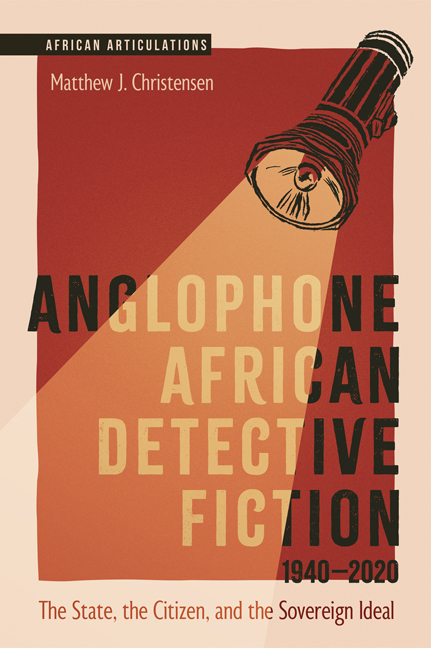Book contents
- Frontmatter
- Dedication
- Contents
- List of Illustrations
- Acknowledgements
- Introduction
- Part 1 Africanizing Detective Fiction’s Un/Sovereign Subjects
- Part 2 Neoliberal Noir
- Conclusion: The Future Imperfect
- An Anglophone African Detective Fiction Bibliography, 1940–2023
- Bibliography
- Index
- Miscellaneous Endmatter
6 - Managed Risk and the Deadly Allure of Transparency
Published online by Cambridge University Press: 11 May 2024
- Frontmatter
- Dedication
- Contents
- List of Illustrations
- Acknowledgements
- Introduction
- Part 1 Africanizing Detective Fiction’s Un/Sovereign Subjects
- Part 2 Neoliberal Noir
- Conclusion: The Future Imperfect
- An Anglophone African Detective Fiction Bibliography, 1940–2023
- Bibliography
- Index
- Miscellaneous Endmatter
Summary
Rosina Umelo's Finger of Suspicion (1984) and Angela Makholwa's Red Ink (2007) emerge, respectively, from the diverse political and cultural geographies of late oil-boom, military dictatorship Nigeria and post-apartheid South Africa, which is to say just prior to the extensive IMF-directed liberalization of Nigeria's economy and a decade after South Africa's new post-apartheid constitution enshrined free-market rationalities as the path to racial equality. In contrast to the crime mysteries discussed in previous chapters, which spotlight some of neoliberal capitalism's most abject victims, Umelo's and Makholwa's novels focus on the lives of neoliberal capitalism's presumed beneficiaries, the upwardly mobile business owners and corporate managers who make up a small but important segment of African society. Their protagonists are in many ways exemplars of neoliberal virtue. They embrace unreflexively both the core liberal values of individual freedom and unfettered entrepreneurialism and the neoliberal-inflected ideals of data-driven decision-making, self-branding, and continual improvement. They are, in short, keen adherents of the neoliberal conceit that economically self-governing individuals drive societal progress. Crucially, they demonstrate their virtuous self-governance publicly through a devoted practice of personal transparency. By making visible their own investments in the self, they publicize their worthiness in communities ruled by the demands of flexibility, measurable outcomes, and meritorious reward. They demonstrate Cynthia Katz's contention that to make one's value publicly transparent through techniques of self-branding is to make oneself ‘sensible to those with money and resources – to be codified as (worthy) partners’ (2005: 625). By their own markers of achievement – regular promotions, an expanding client base, and increasingly lucrative contracts – the characters reap the rewards for broadcasting their neoliberal prowess.
Umelo and Makholwa test their protagonists’ faith in the ideals of selfgovernance and transparency by plunging them into nightmare worlds where their carefully calibrated acts of self-disclosure threaten to undermine every form of security that they take for granted. Chief among the threats is the calculated charge of wrong-doing leveled by rivals seeking to gain their own personal economic advantages.
- Type
- Chapter
- Information
- Anglophone African Detective Fiction 1940-2020The State, the Citizen, and the Sovereign Ideal, pp. 169 - 184Publisher: Boydell & BrewerPrint publication year: 2024

